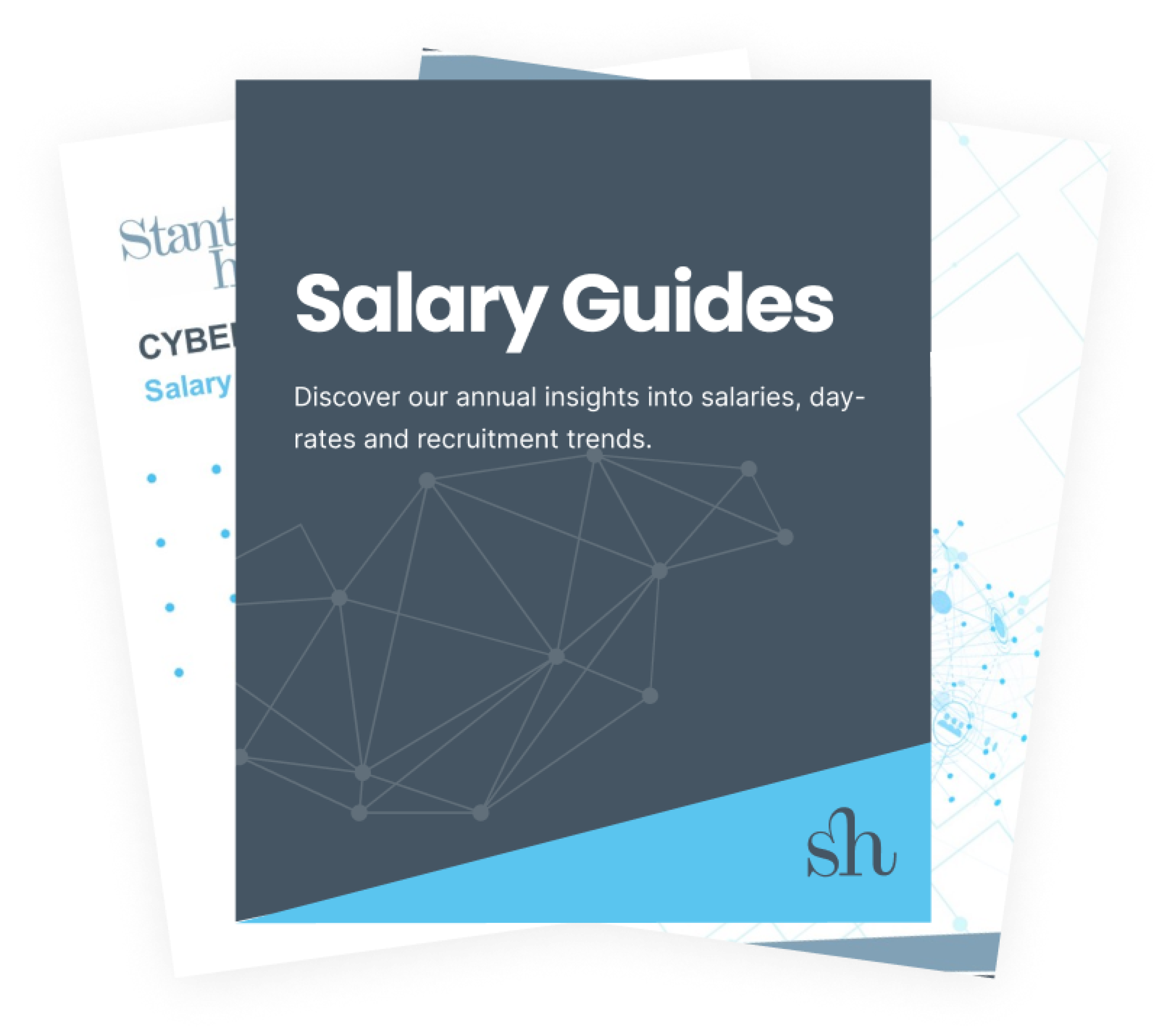
AI in Action: The Evolving Role of Data Leaders in a Transforming World
Artificial Intelligence is no longer just a buzzword – it’s a driving force behind business transformation. From automating tasks to unlocking real-time insights, AI is reshaping how organisations operate, compete, and grow. In my role as a specialist recruitment consultant, I work closely with both permanent and interim Data, Analytics & AI professionals, helping them find the right opportunities with organisations on ambitious transformation journeys. Every day, I speak with data leaders and tech talent navigating this fast-evolving landscape, and what’s clear is this: AI isn’t just a tool - it’s a catalyst for change, and those who can embrace it responsibly and strategically are the ones making the biggest impact.
This blog explores the multifaceted impact of AI on organisations, the evolving responsibilities of data professionals, and what both candidates and employers need to know to stay ahead.
The Impact of Artificial Intelligence
AI technologies, including generative AI (creating new content or data) and directive AI (providing recommendations based on analysis), are revolutionising how organisations operate and make decisions. AI-driven analytics deliver deeper insights into customer behaviour, enabling tailored strategies that enhance customer experience and fuel growth.
From my conversations with hiring managers, I know there’s a growing demand for professionals who can not only analyse data but apply AI tools to deliver measurable business value. The collaboration between technical and strategic teams is more important than ever, with AI serving as a vital driver of competitive advantage and long-term success.
For data leaders, building AI strategies that align with organisational goals requires a careful balance between innovation and practicality. I’ve seen a shift in the types of roles and skill sets employers are prioritising - those that enable automation, optimise operations, and elevate the customer experience are in high demand.
AI is also pushing data teams to think more creatively. Generative AI is opening new avenues for product development and service innovation, while directive AI is enhancing forecasting and real-time decision-making. The result? A broader scope of opportunity for professionals ready to think beyond traditional analytics.
Data Readiness: A Foundational Step
One of the first things I ask clients exploring AI-led transformation is whether their data is ready. It’s not the most glamorous part of the AI journey, but it’s essential. Accurate, complete, and reliable data is the bedrock of successful AI deployment. Without it, even the smartest models will fall short.
Robust data governance, strong security protocols, and seamless integration across platforms are key areas where I see organisations investing - and where I advise candidates to build expertise. These foundational steps are not just about risk mitigation; they enable innovation and scalability.
“AI is transforming the way we work at Stanton House, and my role has evolved significantly as we harness its potential... AI-powered analytics help us extract deeper insights, automate reporting, and enhance decision-making across the business.”
Karen Hendry, Data & Reporting Manager, Stanton House
This growing demand is creating exciting opportunities for data professionals to broaden their remit and lead initiatives that will shape the future of their organisations.
Risks to Navigate
While AI offers a host of benefits, I also see first-hand the risks and concerns clients are grappling with. One of the biggest is the pace of change. Skills that were highly sought-after two years ago may no longer be enough. That’s why I always encourage candidates to continuously upskill - especially around AI literacy, ethics, and integration.
“Upskilling our teams has been a crucial part of our AI adoption journey at Stanton House... This isn’t about replacing expertise – it’s about enhancing it.” Karen Hendry, Data & Reporting Manager, Stanton House
Ethical considerations are also front and centre. Bias in algorithms is not just a technical flaw - it can have real-world consequences in recruitment, lending, and healthcare. As AI becomes embedded in decision-making, data leaders must ensure transparency and fairness. Candidates with an awareness of these issues stand out in the hiring process.
And then there’s the human element. In every AI conversation I have with clients, I reinforce the importance of maintaining human oversight. AI should amplify human intelligence, not replace it, and that principle is central to Stanton House’s own approach to AI adoption:
“At Stanton House, we integrate AI and technology into our recruitment processes to improve efficiency, but always with great care. Every tool we implement is rigorously assessed to ensure it enhances, rather than diminishes, the human experience. AI should never come at the expense of personal engagement or service quality. Instead, it should empower our teams to spend more time where it matters most - building meaningful relationships and delivering exceptional outcomes for our clients and candidates.” Helen Firth, Associate Director, Stanton House
Data Privacy & Security in AI-Powered Systems
As organisations integrate AI into their operations, data privacy and security have emerged as critical concerns - especially in the use of Large Language Models (LLMs) like ChatGPT. While these tools offer significant efficiency and automation benefits, they also introduce new risks that data leaders and professionals must carefully navigate.
One of the biggest challenges with AI-powered language models is that they rely on user-submitted data to generate responses. If employees unknowingly input sensitive or proprietary information, there’s a risk that this data could be exposed or even incorporated into the model’s learning processes. This raises serious concerns about data security, confidentiality, and GDPR compliance. Under GDPR regulations, businesses are required to protect personal data and ensure it is only used for authorised purposes. Using AI tools without proper governance could accidentally result in data breaches, as companies may not have full visibility into how and where their data is processed once it enters an LLM. Data professionals must ensure that data privacy policies are updated to address these risks and that clear guidelines are established on how AI tools should be used within the organisation.
I’ve seen companies pause deployments over fears around data leakage or non-compliance. The key is education and clear governance.
Organisations must update data privacy policies, establish usage guidelines for AI tools, and ensure teams understand what data is safe to input. For candidates, especially those in governance and architecture roles, experience with secure AI implementation is becoming a significant hiring advantage.
The Role of Data Leaders in Responsible AI Adoption
Data leaders today have a huge responsibility - not just to deliver results, but to do so ethically and sustainably. Based on what I’m seeing across the market, their key focus areas include:
- Educating teams on responsible AI usage
- Implementing governance frameworks around AI tools
- Exploring secure, private AI models
- Ensuring regulatory compliance
At Stanton House, we’re seeing an increase in demand for professionals who can drive responsible AI adoption - particularly those with experience in scalable machine-learning models, AI-driven automation, and cross-functional data strategies.
AI is here to stay, and its influence is only growing. As someone who connects Data, Analytics & AI professionals with organisations on a transformation journey, I see enormous potential for both sides. For employers, now is the time to invest in forward-thinking data leaders. For professionals, it's a moment to embrace change, develop new capabilities, and lead the charge in shaping a smarter, more connected future.
Data, Analytics & AI Salary Guide 2025 – Request Your Copy!
Please reach out to me to request a copy of our latest salary guide. Inside you’ll discover the roles and skills in high demand as well as salary ranges and contractor day rates across Data, Analytics & AI roles.
If you’re navigating these challenges or looking to take the next step in your data career, I’d love to hear from you!


















